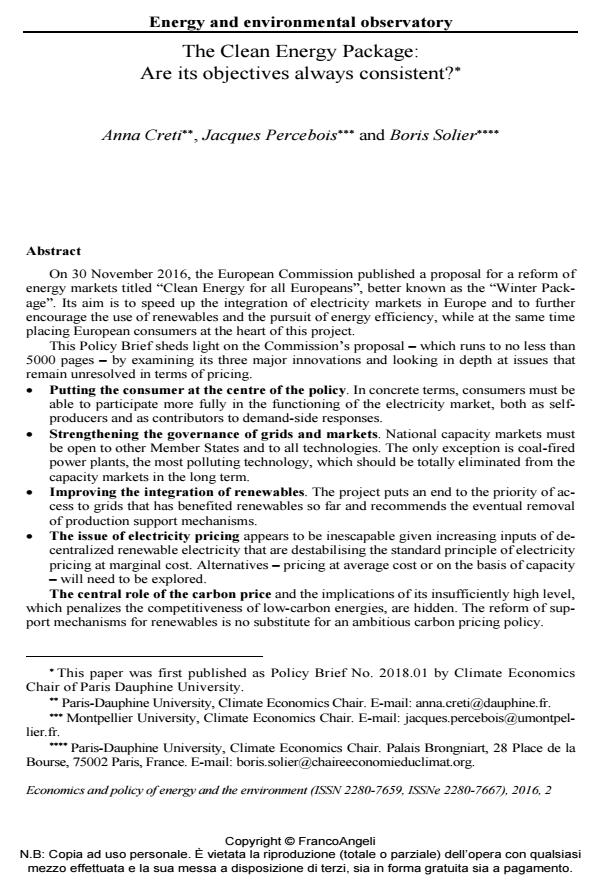The Clean Energy Package: Are its objectives always consistent?
Titolo Rivista ECONOMICS AND POLICY OF ENERGY AND THE ENVIRONMENT
Autori/Curatori Anna Creti, Jacques Percebois, Boris Solier
Anno di pubblicazione 2017 Fascicolo 2016/2 Lingua Inglese
Numero pagine 10 P. 5-14 Dimensione file 177 KB
DOI 10.3280/EFE2016-002001
Il DOI è il codice a barre della proprietà intellettuale: per saperne di più
clicca qui
Qui sotto puoi vedere in anteprima la prima pagina di questo articolo.
Se questo articolo ti interessa, lo puoi acquistare (e scaricare in formato pdf) seguendo le facili indicazioni per acquistare il download credit. Acquista Download Credits per scaricare questo Articolo in formato PDF

FrancoAngeli è membro della Publishers International Linking Association, Inc (PILA)associazione indipendente e non profit per facilitare (attraverso i servizi tecnologici implementati da CrossRef.org) l’accesso degli studiosi ai contenuti digitali nelle pubblicazioni professionali e scientifiche
On 30 November 2016, the European Commission published a proposal for a reform of energy markets titled "Clean Energy for all Europeans", better known as the "Winter Pack-age". Its aim is to speed up the integration of electricity markets in Europe and to further encourage the use of renewables and the pursuit of energy efficiency, while at the same time placing European consumers at the heart of this project. This Policy Brief sheds light on the Commission’s proposal - which runs to no less than 5000 pages - by examining its three major innovations and looking in depth at issues that remain unresolved in terms of pricing. Putting the consumer at the centre of the policy. In concrete terms, consumers must be able to participate more fully in the functioning of the electricity market, both as self-producers and as contributors to demand-side responses. Strengthening the governance of grids and markets. National capacity markets must be open to other Member States and to all technologies. The only exception is coal-fired power plants, the most polluting technology, which should be totally eliminated from the capacity markets in the long term. Improving the integration of renewables. The project puts an end to the priority of access to grids that has benefited renewables so far and recommends the eventual removal of production support mechanisms. The issue of electricity pricing appears to be inescapable given increasing inputs of decentralized renewable electricity that are destabilising the standard principle of electricity pricing at marginal cost. Alternatives - pricing at average cost or on the basis of capacity - will need to be explored. The central role of the carbon price and the implications of its insufficiently high level, which penalizes the competitiveness of low-carbon energies, are hidden. The reform of support mechanisms for renewables is no substitute for an ambitious carbon pricing policy.
Keywords:EU energy policy, electricity pricing, renewables, governance
Jel codes:L9, P43, Q48
- Agency for the Cooperation of Energy regulators (ACER) (2015). ACER Annual Activity Report for the year 2014. May 2015.
- Commission de Régulation de l’Energie (CRE) (2017). Réactions de la CRE au paquet énergie propre. Position paper, January 2017.
- De Perthuis C., Solier B. and Trotignon R. (2016). How should the EU ETS be reformed following the Paris agreement and Brexit? Climate Economics Chair, Policy Brief No. 2016-01, July 2016.
- European Commission (EC) (2015). Best practices on Renewable Energy Self-consumption. Staff Working Document COM(2015) 339 final, Brussels, July 2015.
- European Commission (EC) (2016). Clean Energy for All Europeans – unlocking Europe’s growth potential. Press release IP/16/4009, Brussels, November 2016. --Available on: http://europa.eu/rapid/press-release_IP-16-4009_en.htm.
- European Commission (EC) (2016). Final Report of the Sector Inquiry on Capacity Mecha-nisms. COM(2016) 752 final, Brussels, November 2016.
- Hansen J-P. and Percebois J. (2015). Energie: Economie et politiques. De Boeck, 2nd Edition.
- Réseau de Transport d’électricté (RTE) (2014). Mécanisme de capacité. Rapport d’accompagnement et proposition de règles. Paris, April 2014.
- Present state and perspectives of variable renewable energies in Spain Roberto Gómez-Calvet, José Manuel Martínez-Duart, Silvia Serrano Calle, in The European Physical Journal Plus 126/2018
DOI: 10.1140/epjp/i2018-11960-9
Anna Creti, Jacques Percebois, Boris Solier, The Clean Energy Package: Are its objectives always consistent? in "ECONOMICS AND POLICY OF ENERGY AND THE ENVIRONMENT" 2/2016, pp 5-14, DOI: 10.3280/EFE2016-002001